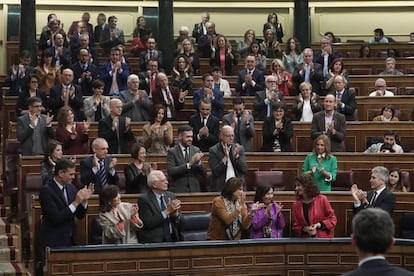Spanish government headed for defeat in Congress over 2019 budget
Parties that support Catalan independence are unlikely to back Prime Minister Sánchez’s plan, meaning that a general election could be called for the coming months

The government of Pedro Sánchez has resigned itself to the fact that its 2019 budget has scant chance of being approved in Congress, a situation that will most likely lead to the Socialist Party (PSOE) prime minister having to call a snap election. During an eight-hour debate in Congress on Tuesday, one that continued on Wednesday morning, the government made a last-bid attempt to convince other parties to back the plan, but the opposition of pro-Catalan independence parties is likely to lead to defeat.
Sánchez came to power in June 2018 after tabling a successful motion of no confidence against former Prime Minister Mariano Rajoy, of the conservative Popular Party (PP). However, since then he has been in a weak position in Congress, with just 84 seats in the 350-seat house, with 176 votes needed for a majority. As such, he needs the support of parties such as left-wing Podemos, the Catalan Republican Left (ERC) and the Catalan European Democratic Party (PDeCAT) to pass legislation, including his 2019 budget plan.
But the ERC and PDeCAT have been threatening for over a week to withhold their support for the 2019 budget, if the government does not make more concessions over the issue of Catalan independence and the trial of the pro-independence leaders involved in the 2017 illegal referendum in the region and subsequent declaration of independence, which began in the Supreme Court on Tuesday.
Pro-Catalan independence parties have been threatening to withhold their support for the 2019 budget
In Congress yesterday, the Spanish finance minister, María Jesús Montero, defended the budget plan on strictly social-economic terms, arguing that they include more investment for the northeastern region of Catalonia, and an improvement in the quality of life of citizens in general. If the pro-independence parties reject the 2019 public accounts, she warned, they would damage “Catalans in particular, and all Spaniards in general.”
Barring any last-minute surprises, the budget will be voted down today, given that the government refuses to make any concessions to the pro-secessionist parties. “This government will not accept self-determination, not now, not ever,” said Montero on Tuesday in response to the ERC spokesperson, Joan Tardà, and his calls for a referendum – something that would not be allowed under the Spanish Constitution. “I call on you to reflect on and approve this budget; if you do otherwise, you will be committing a historical mistake, about which you will have to give explanations to the Catalan people.”
But despite her appeals, ERC and PDeCAT are almost definitely going to vote against the plan, as will the conservative PP and center-right group Ciudadanos (Citizens) – two parties that have been long calling for the renewed suspension of Catalonia’s regional powers under Article 155 of the Constitution, a legal means that was used by the PP in the wake of the 2017 unilateral declaration of independence.
Until last week the central government had been in negotiations with the pro-independence parties in a bid to find a solution to the Catalan issue. But these were called off by Madrid due to the insistence of the Catalan government that there be a referendum on independence, and after controversy involving plans to include an observer at cross-party talks that had been scheduled. It is unclear what this figure – which had been described as a cross between a rapporteur, a mediator and a notary – would have been tasked with doing at the talks, but the opposition said it was a concession to the Catalan separatists, who have repeatedly asked for international mediation.
I call on you to reflect on and approve this budget; if you do otherwise, you will be committing a historical mistake Finance Minister María Jesús Montero
“It wasn’t us who got up and walked away from the negotiating table last week,” said ERC spokesperson Joan Tardà in Congress yesterday, in response to the criticism of the finance minister.
For his part, the regional premier of Catalonia, Quim Torra, has called on Sánchez to return to negotiations. “The ball is in the court of the government,” he said, Lucía Abellán reports. “But we have to talk about the right to self-determination and an international rapporteur.”
With these two demands on the table, reaching a deal will be incredibly difficult, leading sources from the government to admit last night that elections are ever closer. La Moncloa, the seat of the Spanish government, has practically ruled out April 14 as a possible date. More likely is April 28, or even a “Super-Sunday” on May 26, a day when European, regional and municipal elections are already planned.
English version by Simon Hunter.
Tu suscripción se está usando en otro dispositivo
¿Quieres añadir otro usuario a tu suscripción?
Si continúas leyendo en este dispositivo, no se podrá leer en el otro.
FlechaTu suscripción se está usando en otro dispositivo y solo puedes acceder a EL PAÍS desde un dispositivo a la vez.
Si quieres compartir tu cuenta, cambia tu suscripción a la modalidad Premium, así podrás añadir otro usuario. Cada uno accederá con su propia cuenta de email, lo que os permitirá personalizar vuestra experiencia en EL PAÍS.
¿Tienes una suscripción de empresa? Accede aquí para contratar más cuentas.
En el caso de no saber quién está usando tu cuenta, te recomendamos cambiar tu contraseña aquí.
Si decides continuar compartiendo tu cuenta, este mensaje se mostrará en tu dispositivo y en el de la otra persona que está usando tu cuenta de forma indefinida, afectando a tu experiencia de lectura. Puedes consultar aquí los términos y condiciones de la suscripción digital.








































